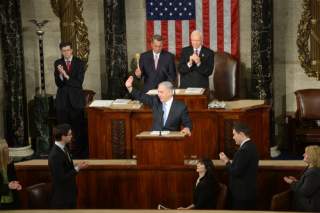False Flag: The Bogus Uproar over Iran's Nuclear Sunset
Opponents of a nuclear deal have grabbed onto a common provision in a last-ditch attempt to sabotage talks.
3. During the period of the agreement, Iran would permit even more intrusive inspections than what these agreements with the IAEA would normally allow (and, if press reports are accurate, intrusive inspections could continue for a period after physical restrictions on Iran’s nuclear program end). Of course, it is also notable that the United States continues to seek a strengthened international nonproliferation system -- including through IAEA inspections -- and that Iran would be expected to fulfill the normal requirements of any IAEA-inspected country, whatever those may be, at the time a deal formally concludes.
Iran would be treated like any other NPT state party in compliance with its international obligations after the term of the agreement formally ends. Nowhere has the United States agreed that Iran would be immunized forever more from international scrutiny after a deal eventually ends. Should Iran attempt to move to nuclear weapons after that time, it would be acting in contravention of its NPT obligations. Among other things, this would permit the United States and its partners to respond with a range of options, up to and including the use of military force. A sunset would therefore cut both ways for Iran, creating a possibility for Iran to test the fences again in pursuit of a nuclear option, but only with the potential for future costs and risks that any Iranian leader would have to respect.
So what’s the real problem
The previous examples all demonstrate that “sunsetting” is not a problem, either conceptually or specifically with Iran, and that it is an appropriate, standard, and reasonable way to address a long-term national security issue.
Most people currently taking issue with the sunset clause are really just opposed to any deal with Iran. Prime Minister Netanyahu’s comments this week were instructive in this regard. His address to Congress suggested that a sunset is not a problem in and of itself but rather that it becomes one because of the nature of the Islamic Republic of Iran and its foreign policy. As such, he argued that the United States should use negotiations to secure Iranian commitments that are antithetical to the broader Iranian foreign policy approach. Repugnant as many aspects of Iranian foreign policy are, this is still no guide to a negotiation with representatives of the Iranian government. By demanding that these issues be resolved in negotiations, Netanyahu is -- in effect -- arguing that, unless Iran promises regime change in the future, there can be no deal.
With this in mind, the issue of the duration of the restrictions and their scope ironically become less important. Indeed, Prime Minister Netanyahu’s observation that a decade is not enough time for a generational change in Iran is probably accurate. As the administration has repeatedly stressed, the key question is not when we can trust Iran, but when we can verify that it is not doing what it should not be doing. This is something that can be measured, assessed, and reported by international inspectors...but only if they are permitted to implement the deal now being negotiated.
Conclusion
As a long-time antagonist of the Iranian nuclear program, it is not easy to contemplate a future in which Iran’s nuclear program is free from constraints beyond those of any other NPT state party. Iran’s history of obfuscation and willful defiance of its international nuclear obligations for 30 years are difficult to get past, especially when considering Iran’s many other activities that are antithetical to U.S. interests and a common sense of decency.
However, the simple reality is that Iran will not accept a deal in which it is a second-class NPT citizen forever and insisting upon it would spell the end of the negotiating process. The sunset provision that the negotiators have in mind would address U.S. national security requirements as well as protect the interests of our allies and partners. We should not jeopardize a sufficient solution for an unachievable ideal one.
Richard Nephew is a former member of the U.S. negotiating team with Iran and Director for Iran at the National Security Council. He is currently a non-resident senior fellow at the Brookings Institution and program director at Columbia's Center on Global Energy Policy.
Image: Office of the Prime Minister of Israel

